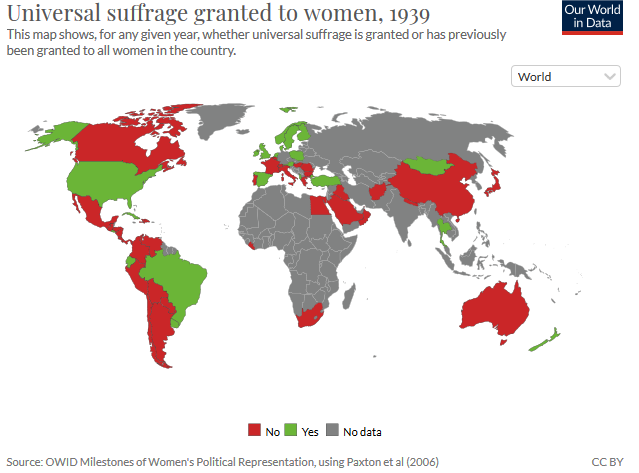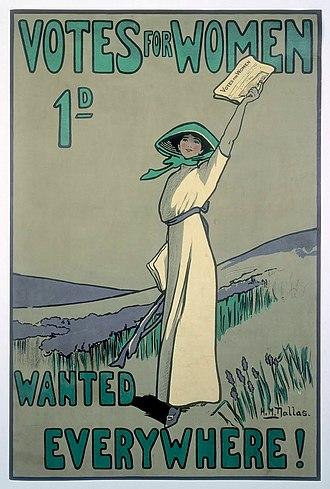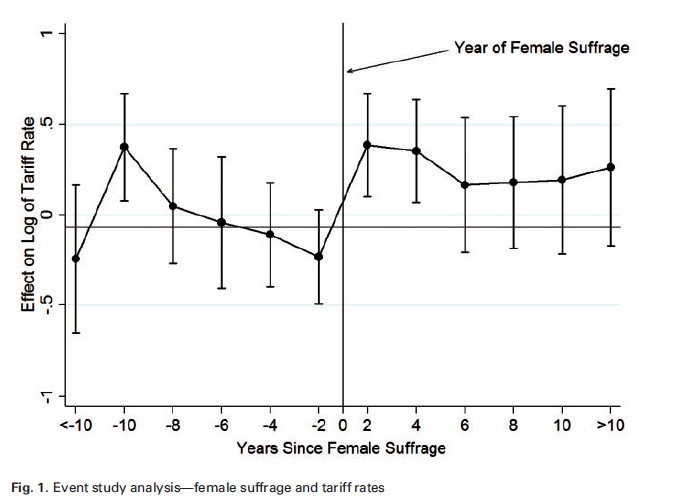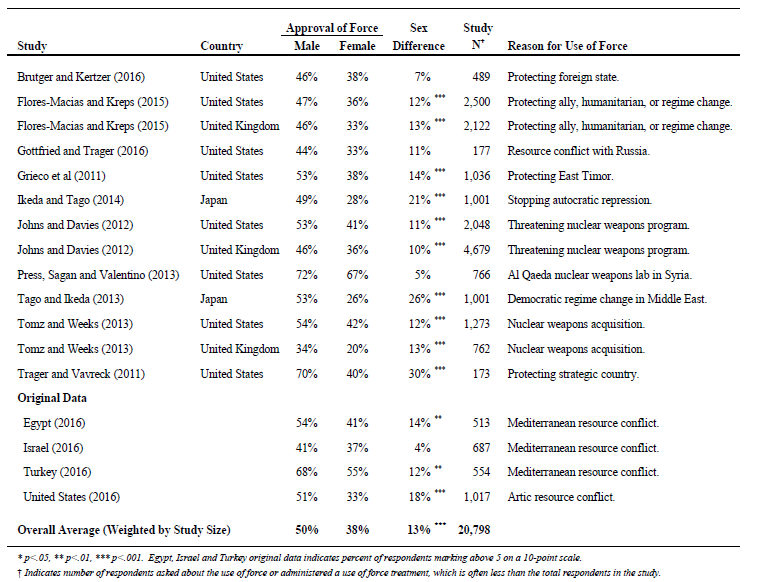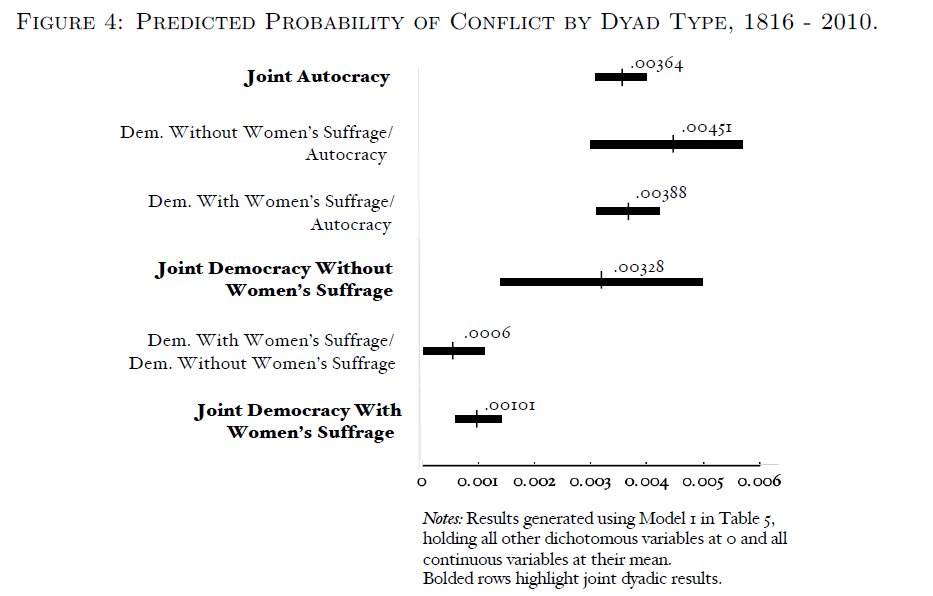Last week marked the 100th Anniversary of #19thAmendment  https://abs.twimg.com/hashflags... draggable="false" alt="">
https://abs.twimg.com/hashflags... draggable="false" alt="">
This is a perfect opportunity to reflect on how women gaining the right to vote fundamentally changed international politics.
How? It transformed trade and war.
[THREAD]
This is a perfect opportunity to reflect on how women gaining the right to vote fundamentally changed international politics.
How? It transformed trade and war.
[THREAD]
While I mentioned #19thAmendment  https://abs.twimg.com/hashflags... draggable="false" alt=""> above,
https://abs.twimg.com/hashflags... draggable="false" alt=""> above,  https://abs.twimg.com/emoji/v2/... draggable="false" alt="🇺🇸" title="Flagge der Vereinigten Staaten" aria-label="Emoji: Flagge der Vereinigten Staaten"> was NOT the first country to grant suffrage to women (but it was also not the last).
https://abs.twimg.com/emoji/v2/... draggable="false" alt="🇺🇸" title="Flagge der Vereinigten Staaten" aria-label="Emoji: Flagge der Vereinigten Staaten"> was NOT the first country to grant suffrage to women (but it was also not the last).
It truly was a process of https://abs.twimg.com/emoji/v2/... draggable="false" alt="🌍" title="Europa-Afrika auf dem Globus" aria-label="Emoji: Europa-Afrika auf dem Globus">diffusion.
https://abs.twimg.com/emoji/v2/... draggable="false" alt="🌍" title="Europa-Afrika auf dem Globus" aria-label="Emoji: Europa-Afrika auf dem Globus">diffusion.
Here is a map from @OurWorldInData showing which countries granted universal women& #39;s suffrage in 1919
It truly was a process of
Here is a map from @OurWorldInData showing which countries granted universal women& #39;s suffrage in 1919
These maps draw on data produced by @melaniemhughes, Pamela Paxton, and Jennifer L Green for their 2006 @asr_journal piece https://journals.sagepub.com/doi/abs/10.1177/000312240607100602">https://journals.sagepub.com/doi/abs/1...
Important note: these maps are for UNIVERSAL suffrage. For example, @cmMcConnaughy shows how many  https://abs.twimg.com/emoji/v2/... draggable="false" alt="🇺🇸" title="Flagge der Vereinigten Staaten" aria-label="Emoji: Flagge der Vereinigten Staaten"> states had granted suffrage well before 1920 #v=onepage&q&f=false">https://books.google.com/books?id=3fDXAAAAQBAJ&printsec=frontcover&source=gbs_ge_summary_r&cad=0 #v=onepage&q&f=false">https://books.google.com/books...
https://abs.twimg.com/emoji/v2/... draggable="false" alt="🇺🇸" title="Flagge der Vereinigten Staaten" aria-label="Emoji: Flagge der Vereinigten Staaten"> states had granted suffrage well before 1920 #v=onepage&q&f=false">https://books.google.com/books?id=3fDXAAAAQBAJ&printsec=frontcover&source=gbs_ge_summary_r&cad=0 #v=onepage&q&f=false">https://books.google.com/books...
So as women gained the right to vote in country after country after country, how and why should we expect this to alter relations b/w those countries?
Let& #39;s turn to two areas recently explored by scholars: trade and war.
Wrt international trade, consider this Oxford Economic Papers piece by @alandebromhead https://academic.oup.com/oep/article-abstract/70/1/22/3866901">https://academic.oup.com/oep/artic...
The paper builds on the consistent finding in surveys that women tend to be more protectionist than men.
For example, see this @ISQ_Jrnl piece by Edward D. Mansfield, Diana C. Mutz, & @lauraruthsilver https://academic.oup.com/isq/article-abstract/59/2/303/1790343">https://academic.oup.com/isq/artic...
For example, see this @ISQ_Jrnl piece by Edward D. Mansfield, Diana C. Mutz, & @lauraruthsilver https://academic.oup.com/isq/article-abstract/59/2/303/1790343">https://academic.oup.com/isq/artic...
Scholars still don& #39;t fully know the reason for the "gender gap" in trade attitudes (that can be it& #39;s own twitter thread).
But given that it seems to exist, what are the implications?
But given that it seems to exist, what are the implications?
Specifically, if women tend to be more protectionist and given that women were gradually granted the right to vote throughout the world during the 1920s and into the 1930s, might THIS explain the global decline in trade associated with the great depression?
It& #39;s already well established that increased voting rights and representation of previously disenfranchised (primarily working-class) men altered, for example, the ability of governments to adhere to the Gold Standard. See, most notably, @B_Eichengreen #v=onepage&q&f=false">https://books.google.com/books?id=Qk1flhynCD8C&printsec=frontcover&source=gbs_ge_summary_r&cad=0 #v=onepage&q&f=false">https://books.google.com/books...
You could reasonably expect this argument to apply to enfranchising women. Indeed, @alandebromhead points to anecdotal evidence supporting this view:
After showing evidence from a 1939 @Forbes, @alandebromhead turns to cross-country panel data analysis...
...where he evaluates a model that seeks to understand how a country& #39;s average tariff rate (total customs revenue divided by the value of total imports) is influenced by the country granting universal suffrage
His core findings are shown in this figure. As he writes, "where women were able to vote, tariffs tended to be higher. Uncovering this effect suggests an important factor that conceivably contributed to higher levels of trade protection during the interwar years."
Wrt war, consider this recent @foreignaffairs piece by Joslyn N. Barnhart, Robert F. Trager, @ProfSaunders, and Allan Dafoe https://www.foreignaffairs.com/articles/united-states/2020-08-18/womens-suffrage-and-democratic-peace?utm_medium=social&utm_campaign=tw_daily_soc&utm_source=twitter_posts">https://www.foreignaffairs.com/articles/...
This piece draws on their forthcoming @IntOrgJournal article
This article takes on the "Democratic Peace" finding: the idea that democracies rarely fight one another.
A problem of that finding is that the mechanism for WHY this is the case remains unclear https://twitter.com/ProfPaulPoast/status/1172534001900429313">https://twitter.com/ProfPaulP...
@ProfSaunders et al bring fresh insights to this literature by drawing on the critique of @DrLauraEsq that studies of democratic peace can& #39;t be "genderless" #v=onepage&q&f=false">https://books.google.com/books?id=vu3Dq2sXmz4C&printsec=frontcover&source=gbs_ge_summary_r&cad=0 #v=onepage&q&f=false">https://books.google.com/books...
Not having gender be part of the democratic peace analysis matters because there is a 2nd "gender gap": women, by and large, tend to be less supportive of using military force.
For example, see the @ISQ_Jrnl paper by @IkeEichenberg https://academic.oup.com/isq/article-abstract/60/1/138/2359047?redirectedFrom=fulltext">https://academic.oup.com/isq/artic...
For example, see the @ISQ_Jrnl paper by @IkeEichenberg https://academic.oup.com/isq/article-abstract/60/1/138/2359047?redirectedFrom=fulltext">https://academic.oup.com/isq/artic...
This would suggest two possible findings:
- countries w/ universal women& #39;s suffrage should be less likely to enter conflict.
- If 2 countries have universal women& #39;s suffrage, then it& #39;s VERY unlikely that either country will use force against the other.
Ego, Democratic Peace!
- countries w/ universal women& #39;s suffrage should be less likely to enter conflict.
- If 2 countries have universal women& #39;s suffrage, then it& #39;s VERY unlikely that either country will use force against the other.
Ego, Democratic Peace!
What do they find? After bolstering the "gender gap" claim by conducting an extensive meta-analysis of previous surveys, they turn to quantitative large-n analysis
Focusing on their "dyadic analysis", they use all directed-dyads (e.g. USA-UK 1950 & UK-USA 1950 are two different observations) from 1816 to 2010.
The outcome variable is the initiation of a militarized dispute. https://twitter.com/ProfPaulPoast/status/1222726682639052800">https://twitter.com/ProfPaulP...
The outcome variable is the initiation of a militarized dispute. https://twitter.com/ProfPaulPoast/status/1222726682639052800">https://twitter.com/ProfPaulP...
They use the Paxton et al all data to measure universal suffrage and they use Polity data to measure whether a country is a democracy (and, yes, Polity is a less than ideal measure) https://twitter.com/benwansell/status/1229386394658836480">https://twitter.com/benwansel...
What do they find? The figure below is pretty striking: it& #39;s not about being a "democracy", but being a "democracy" with "women& #39;s suffrage".
They bring to bear a host of other analyses in order to flesh out this finding.
But the key take away remains the same: it& #39;s a women& #39;s suffragist peace, rather than a democratic peace.
But the key take away remains the same: it& #39;s a women& #39;s suffragist peace, rather than a democratic peace.
One interesting thought:
-- suffrage makes countries more peaceful
-- but suffrage makes countries more protectionist
-- being protectionist makes countries more likely to fight war (see "Commercial peace")
So... https://abs.twimg.com/emoji/v2/... draggable="false" alt="🤔" title="Denkendes Gesicht" aria-label="Emoji: Denkendes Gesicht">
https://abs.twimg.com/emoji/v2/... draggable="false" alt="🤔" title="Denkendes Gesicht" aria-label="Emoji: Denkendes Gesicht">
-- suffrage makes countries more peaceful
-- but suffrage makes countries more protectionist
-- being protectionist makes countries more likely to fight war (see "Commercial peace")
So...

 Read on Twitter
Read on Twitter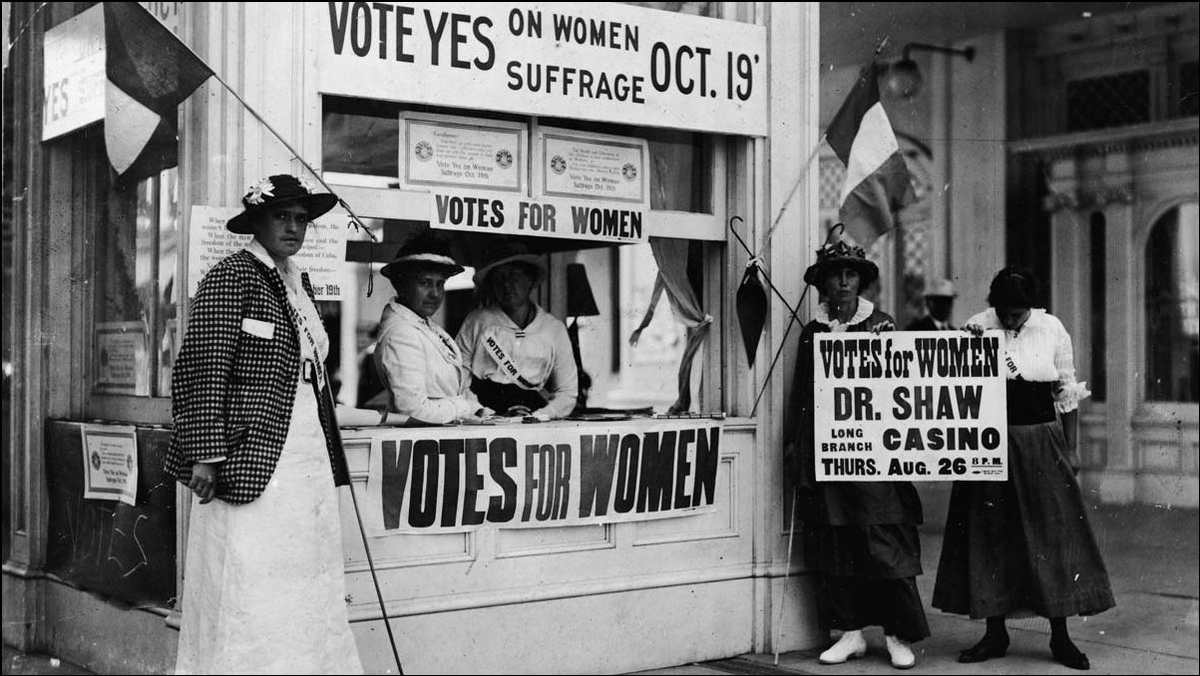 This is a perfect opportunity to reflect on how women gaining the right to vote fundamentally changed international politics. How? It transformed trade and war.[THREAD]" title="Last week marked the 100th Anniversary of #19thAmendment https://abs.twimg.com/hashflags... draggable="false" alt=""> This is a perfect opportunity to reflect on how women gaining the right to vote fundamentally changed international politics. How? It transformed trade and war.[THREAD]" class="img-responsive" style="max-width:100%;"/>
This is a perfect opportunity to reflect on how women gaining the right to vote fundamentally changed international politics. How? It transformed trade and war.[THREAD]" title="Last week marked the 100th Anniversary of #19thAmendment https://abs.twimg.com/hashflags... draggable="false" alt=""> This is a perfect opportunity to reflect on how women gaining the right to vote fundamentally changed international politics. How? It transformed trade and war.[THREAD]" class="img-responsive" style="max-width:100%;"/>
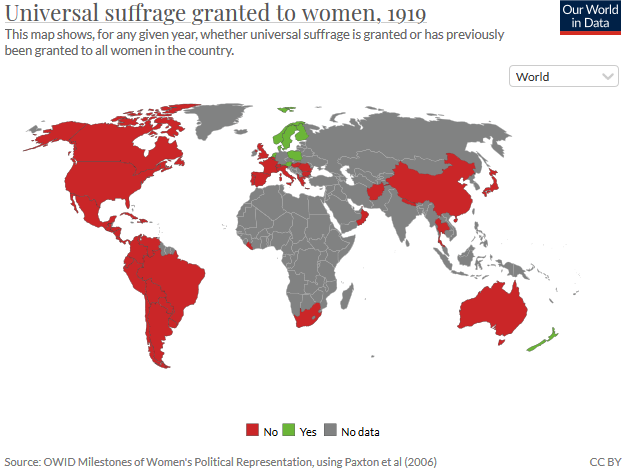 above, https://abs.twimg.com/emoji/v2/... draggable="false" alt="🇺🇸" title="Flagge der Vereinigten Staaten" aria-label="Emoji: Flagge der Vereinigten Staaten"> was NOT the first country to grant suffrage to women (but it was also not the last). It truly was a process of https://abs.twimg.com/emoji/v2/... draggable="false" alt="🌍" title="Europa-Afrika auf dem Globus" aria-label="Emoji: Europa-Afrika auf dem Globus">diffusion.Here is a map from @OurWorldInData showing which countries granted universal women& #39;s suffrage in 1919" title="While I mentioned #19thAmendment https://abs.twimg.com/hashflags... draggable="false" alt=""> above, https://abs.twimg.com/emoji/v2/... draggable="false" alt="🇺🇸" title="Flagge der Vereinigten Staaten" aria-label="Emoji: Flagge der Vereinigten Staaten"> was NOT the first country to grant suffrage to women (but it was also not the last). It truly was a process of https://abs.twimg.com/emoji/v2/... draggable="false" alt="🌍" title="Europa-Afrika auf dem Globus" aria-label="Emoji: Europa-Afrika auf dem Globus">diffusion.Here is a map from @OurWorldInData showing which countries granted universal women& #39;s suffrage in 1919" class="img-responsive" style="max-width:100%;"/>
above, https://abs.twimg.com/emoji/v2/... draggable="false" alt="🇺🇸" title="Flagge der Vereinigten Staaten" aria-label="Emoji: Flagge der Vereinigten Staaten"> was NOT the first country to grant suffrage to women (but it was also not the last). It truly was a process of https://abs.twimg.com/emoji/v2/... draggable="false" alt="🌍" title="Europa-Afrika auf dem Globus" aria-label="Emoji: Europa-Afrika auf dem Globus">diffusion.Here is a map from @OurWorldInData showing which countries granted universal women& #39;s suffrage in 1919" title="While I mentioned #19thAmendment https://abs.twimg.com/hashflags... draggable="false" alt=""> above, https://abs.twimg.com/emoji/v2/... draggable="false" alt="🇺🇸" title="Flagge der Vereinigten Staaten" aria-label="Emoji: Flagge der Vereinigten Staaten"> was NOT the first country to grant suffrage to women (but it was also not the last). It truly was a process of https://abs.twimg.com/emoji/v2/... draggable="false" alt="🌍" title="Europa-Afrika auf dem Globus" aria-label="Emoji: Europa-Afrika auf dem Globus">diffusion.Here is a map from @OurWorldInData showing which countries granted universal women& #39;s suffrage in 1919" class="img-responsive" style="max-width:100%;"/>
